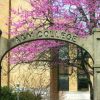calsfoundation@cals.org
Adolph Reed Sr. (1921–2003)
Adolph Reed Sr. was a distinguished educator and activist. As a political scientist, he approached politics from an academic perspective but also actively participated in the broad political process, being particularly involved with labor and civil rights efforts.
Adolph Reed was born in 1921 to Alphonso Reed and Mary Reed. While he spent his early years in Dumas (Desha County), he attended Dunbar High School in Little Rock (Pulaski County). Like many African Americans during this period, his family migrated north, arriving in Chicago in the late 1930s. There, he worked as a railroad dining car waiter before heading to Nashville, Tennessee, where he attended Fisk University. While he ultimately earned his degree from Fisk, his studies were interrupted by World War II. Drafted into the U.S. Army, Reed was part of the Normandy invasion, and he also fought at the Battle of the Bulge. He was involved in protests by Black troops in both Charleston, South Carolina, and Manchester, England, who were disappointed in their poor treatment by their own government. Fellow servicemen recalled him speaking out about the contradiction inherent in African Americans being sent overseas to fight Nazi racism when racial segregation reigned at home.
After his discharge and the completion of his degree at Fisk not long after the war’s end, Reed moved to New York City, where he spent two years in graduate school at New York University (NYU). In addition to his studies, Reed also worked in the New York State Department of Labor. As he pursued his academic study of the American Labor Party, he switched to American University in Washington DC, writing his thesis on the party’s history.
Throughout the 1940s, Reed was active in the American Labor Party, and in 1948 he was a delegate at the Progressive Party Convention that nominated Henry Wallace for president. He also served as a reporter for the Daily Compass, a left-wing New York paper published from 1949 to 1952. Reed’s son, Adolph Jr., recalled that his father “was among the thousands who attended the famous September, 1949, concert in Peekskill, New York, to show support for singer Paul Robeson and to protest right-wing mob and police attacks against Robeson supporters on the site weeks before.”
Once he finished his degree, Reed began his teaching career at Arkansas Agricultural, Mechanical & Normal College (now the University of Arkansas at Pine Bluff). He moved from there to Southern University in Baton Rouge, Louisiana, where he earned a reputation as an inspiring, supportive, and effective teacher. However, in response to the decision by Southern University’s president Felton G. Clark to expel students who had been participating in the civil rights movement’s lunch counter sit-ins, Reed, ever the activist, wrote Clark a scathing ten-page letter of resignation in which he decried Clark’s assertion that the university was only interested in education, asking, “Can education exist in the abstract?” He not only defended the student activists but also described as a “disgusting spectacle” the presence of the troops Felton had brought on campus in an effort to quell the protests. Reed followed that up in early 1962 with an essay in the Nation titled, “Crisis on the Negro Campus,” in which he further criticized Felton.
Subsequently, Reed held visiting professorships at both the University of North Carolina in Chapel Hill and the University of California San Diego, and he also taught at the University of Michigan. In 1971, Reed accepted a position at the University of Arkansas (UA) in Fayetteville (Washington County) as an assistant professor in the political science department, as well as director of the Black Studies Program, an interdisciplinary program offered by the College of Arts and Sciences. He would remain on the UA faculty until his retirement in 1994.
Among his many professional activities, Reed served on both the Arkansas and Louisiana state constitutional convention committees. He was also actively involved with the National Conference of Black Political Scientists, an organization he had helped found in 1969. As his son, political scientist Adolph Reed Jr., noted, his father “remained convinced that both major parties [were] too beholden to corporate interests, which he frequently described as the basis for the ‘perverted priorities’ of American politics.” Consequently, in retirement, the elder Reed had become an active supporter of the new Labor Party, founded in 1996.
Reed and his wife Clarita Macdonald Reed had one son, Adolph Reed Jr. Adolph Reed Sr. died on January 3, 2003.
For additional information:
Interview with Adolph Reed, March 13, 1992. Louie B. Nunn Center for Oral History, University of Kentucky Libraries. https://nunncenter.net/ohms-spokedb/render.php?cachefile=1992oh078_apsa087_ohm.xml (accessed December 10, 2021).
Obituary of Adolph Reed Sr. lbo-talk. http://mailman.lbo-talk.org/2003/2003-January/000801.html (accessed December 10, 2021).
“Tribute to Adolph Reed, Sr., 1921–2003.” Congressional Record Volume 149, Issue 52 (April 1, 2003): H2556–2557.
William H. Pruden III
Ravenscroft School
 Civil Rights and Social Change
Civil Rights and Social Change Divergent Prosperity and the Arc of Reform, 1968–2022
Divergent Prosperity and the Arc of Reform, 1968–2022 Education, Higher
Education, Higher



Comments
No comments on this entry yet.